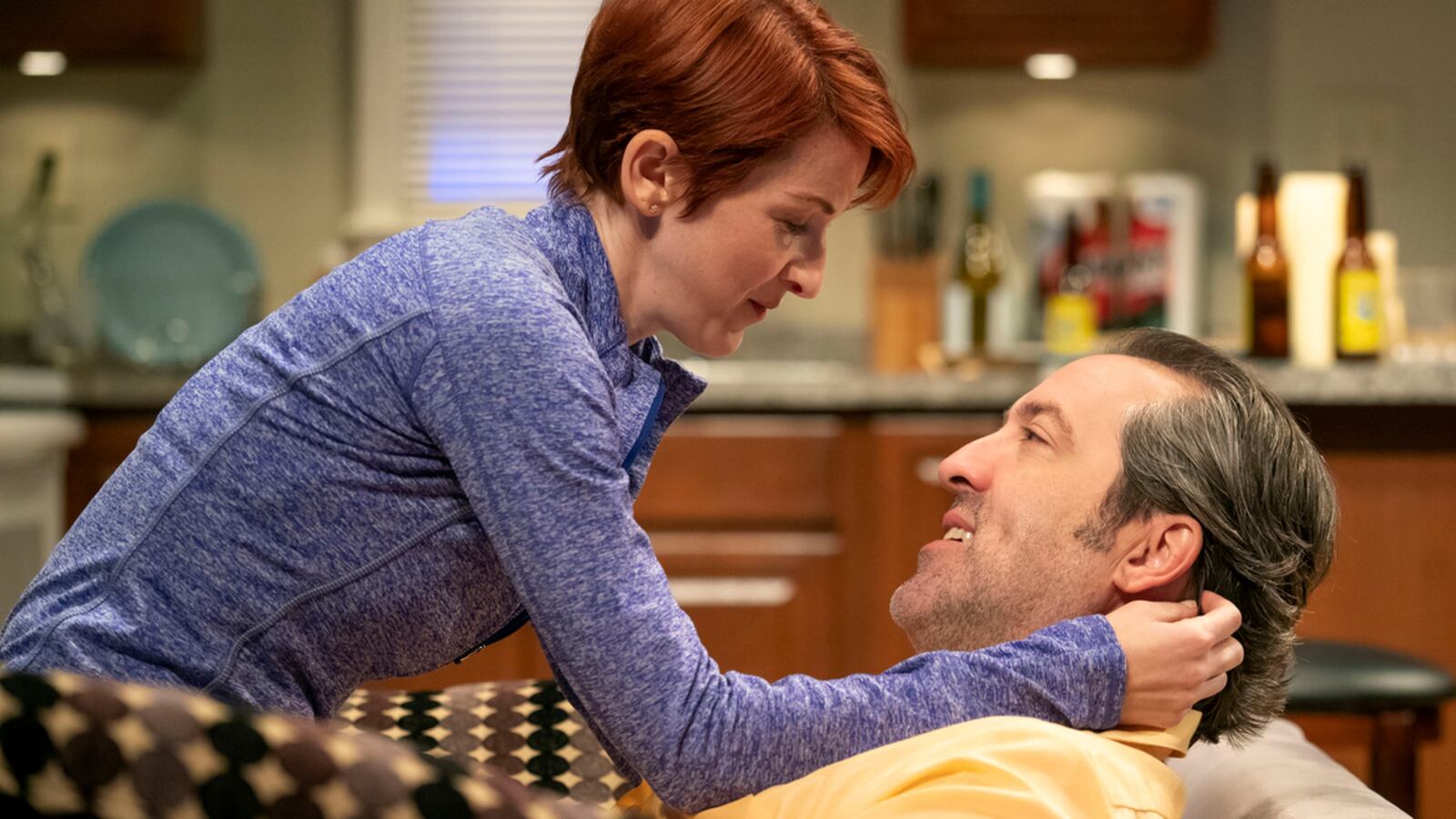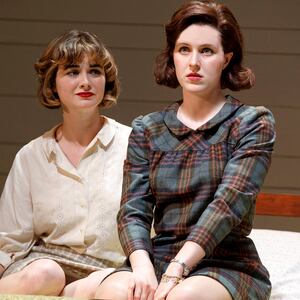What are we to make of Wheeler (Ian Barford) in Tracy Letts’ witty but uneven comedy-drama, Linda Vista?
Well, he is a middle-aged man, newly entering the post-divorce wilderness, who has moved into an apartment that screams “Decrepitude, here I come” in San Diego.
Wheeler isn’t the classic, embittered middle-aged white male, aggrieved and having to re-evaluate who he is and where his life is going. He is a liberal shade of this grouchy and sporadically vicious species. He also, despite speeches about not being seen in a Speedo, is in sexily hot shape. The play’s strangest lines require him to bemoan a body that, visibly, is nothing to bemoan.
The play, directed by Dexter Bullard and staged by the Steppenwolf company for Second Stage at the Helen Hayes Theater on Broadway (to Nov. 10), begins with a New York audience getting square on Wheeler’s side when he launches into a magnificent verbal fusillade against Trump supporters. He has no interest in dating one, or listening to one, nailing the “both sides” canard: They hold views he finds reprehensible. There can be no discussion.
Wheeler has a lot to say about a lot. He’s a social issue foghorn on such matters as the allergies and affectations of today’s youth, and all those movies featuring special effects and not much else.
Wheeler is a familiar aging man adrift, and in some ways this is a very familiar story: How will he get back on the dating train, what is his future? The comedy of Linda Vista—with its simple, folding set by Todd Rosenthal—is clever and funny, sometimes uproariously so.
It is there in the gruff and deep friendship with his buddy Paul (Jim True-Frost) and the men sharing confidences as they towel off in the gym. And it’s there at the fateful karaoke where this misanthropic but decent-ish Oscar the Grouch meets Jules (a poised and sharp Cora Vander Broek), who can’t sing but who is quite clearly perfect, indeed too good, for Wheeler.
Tonally, this is where Linda Vista becomes a little scrambled. Wheeler also works at a camera shop, which has a creepy boss who sexually objectifies a bright, younger staff member, Anita (an excellent Caroline Neff).
Then there is Minnie (Chantal Thuy), who begins life as an assertive younger woman in a crappy relationship who Wheeler meets in a bar, and who within a blink of an eye becomes a needy, space-invading, ultimately manipulative user. Who is she? Letts doesn’t seem to know.
For all his anti-Trumpism, Wheeler seems like a huge shit when it comes to women, and his most horrible speeches—which don’t square with his liberal dude-ism—come when he tries to jettison them out of his life. Is this really a play that has even heard of #MeToo or #TimesUp? It doesn’t feel like it. At the end of the day he rejects Jules for Minnie, because the latter is younger.
So, a liberal on the streets and a douchebag between the sheets.
At the performance I attended, Wheeler’s behavior earned groans and tuts, and the only resounding round of applause came when Jules figured out what a cretin he was and dumped him, emphasizing why she valued her self-respect more. Letts really doesn’t know what to do with Wheeler, and it’s to Barford’s credit that he at least attempts to switch between the registers of goofy good guy and sexist, growling jerk.
Letts attempts two things to redeem Wheeler, though for this critic it’s impossible. First, he contrasts his shitty behavior toward women with the even creepier behavior of Michael (Troy West), who owns the camera shop where Wheeler and Anita work, leading to an explosive confrontation that fizzles because Michael’s creepiness and manner don’t merit the scale of explosive response.
Then, there is art. Wheeler is a frustrated photographer, and so the last moments of the play try to nullify his awfulness around women and try to ensure that art, not love, proves to be his redemption, the final sign of a fundamentally good guy.
Well, sure, fine. But this love of photography is only glancingly mentioned in the preceding almost three hours, as Wheeler blunders through people’s lives.
Letts is clear-aimed with Wheeler’s zingers, his mordant observations of the modern world, and there is something cringe-making about his wrecking-ball approach to anything. But Letts also doesn’t seem to know what kind of middle-aged near-loser Wheeler is: sexist and beyond saving, or a noble holdout who is really kind of OK inside.
During this play, a lot of women tell Wheeler things. He either doesn’t hear them or chooses not to. He’s a heterosexual disaster zone, and one which the playwright (and by extension us) end up feeling a little too ambivalent about. It’s just as well Wheeler’s love of art wins out in the end; a camera may be happier living with him than a living, breathing woman ever could.







